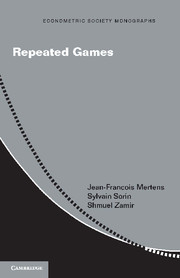Book contents
- Frontmatter
- Contents
- List of Figures
- Foreword
- Preface
- Acknowledgements
- Presentation of the Content
- Part A Background Material
- I Basic Results on Normal Form Games
- II Basic Results on Extensive Form Games
- III The Belief Space
- IV General Model of Repeated Games
- Part B The Central Results
- Part C Further Developments
- Appendix A Reminder about Analytic Sets
- Appendix B Historical Notes
- Appendix C Bibliography
- Appendix D Updates
- Author Index
- Subject Index
- Miscellaneous Endmatter
I - Basic Results on Normal Form Games
Published online by Cambridge University Press: 05 February 2015
- Frontmatter
- Contents
- List of Figures
- Foreword
- Preface
- Acknowledgements
- Presentation of the Content
- Part A Background Material
- I Basic Results on Normal Form Games
- II Basic Results on Extensive Form Games
- III The Belief Space
- IV General Model of Repeated Games
- Part B The Central Results
- Part C Further Developments
- Appendix A Reminder about Analytic Sets
- Appendix B Historical Notes
- Appendix C Bibliography
- Appendix D Updates
- Author Index
- Subject Index
- Miscellaneous Endmatter
Summary
Non-cooperative games (or strategic games) are mainly studied through two models: normal form or extensive form. The latter will be presented in Chapter II. The former describes the choice spaces of each player and the result of their common choices. This is evaluated in terms of the players' von Neumann–Morgenstern utilities (i.e., the utility of a random variable is its expected utility (von Neumann and Morgenstern, 1944, Chapter I, 3.5)), and hence the following definition:
A normal form game is defined by a set of I, strategy spaces Si, i ∈ I, and real payoff functionsFi, i ∈ I, on S = Πi Si.
It is finite (or a bi-matrix game if #I = 2) if I and all Si are finite.
Under suitable measurability conditions one defines the mixed extension of a game G = (I, (Si, Fi)i∈I) as the game Γ = (I, (Σi, φi)i∈I), where Σi is the set of probabilities on Si and φi (σ) = ∫SFi(S) Πi∈I σi(dsi). An element of Si will be called a pure strategy, while an element of Σi will be called a mixed strategy (of player i). Unless explicitly specified (or self-evident), the following definitions are always used on the mixed extension of the game.
si is a dominant strategy of player i if Fi(si, s−i) ≥ Fi (ti, s−i) for all ti in Si, and s−i ∈ S−i = Πh≠iSh.
si is dominated (resp. strictly dominated) if there exists ti with Fi(ti, s−i) > Fi (si, s−i) for some s−i (resp. all s−i) and Fi(ti, ·) ≥ Fi(si,·).
si is an (ε-)best reply to s−i if Fi(si, s−i) ≥ Fi(ti, s−i) (−ε) for all ti ∈ Si.
An (ε-)equilibrium is an I-tuple s such that for every i, si is an (ε-)best reply to s−i.
- Type
- Chapter
- Information
- Repeated Games , pp. 3 - 57Publisher: Cambridge University PressPrint publication year: 2015



